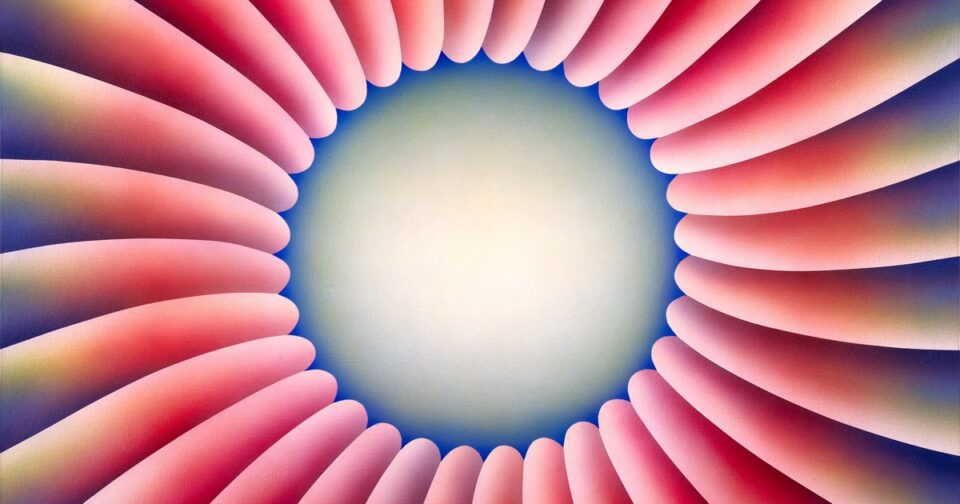
There’s a story you might come across if you spend enough time talking to women about the moon. It goes like this: Many years ago, in some far-off time before written records and industrialization, and definitely before hormonal birth control, the full moon was powerful. It was bright and suggestive. With its plump, glowing presence, it tugged at the luteinizing hormone in women. In this pure menstrual past, all fertile women were so influenced by what was happening in the sky that they ovulated together each month.
The idea that women’s bodies contain an ancient link to the moon is often presented as either feminist counterhistory or wellness-adjacent conspiracy theory. But among many people today, it isn’t exactly either of those things. For some women, a moon-body connection is as much a biological given as allergies or aging. “I heard of the connection directly from my mom when I first got my period,” says Zoë Calsyn, a videographer and editor. “I asked how I was supposed to know when I would get my next period, and she said that she seems to always get hers with a new full moon, and after a few years,
I noticed that I did, too.” Multiple people I spoke to told me they track their period by the full or new moon, and several said their period came early on the day of the recent solar eclipse — one at the exact moment of totality. But even for those women who don’t believe so unequivocally that their uterus is behaving in accordance with Earth’s satellite, establishing a connection has made for better living. About ten years ago, Krista, a publicist, moved from L.A. to rural Pennsylvania. She had been feeling out of sorts and sleeping poorly. She began spending more time outside and doing moon-visualization meditations before bed, which she believes helped regulate both her sleep and her reproductive cycle. “I know it sounds kind of crazy,” she says. “Maybe I’m psychosomatically feeding into it, but I don’t think so. Because a lot of times, I just notice how I’m feeling and then I realize, Oh, it’s a super full moon.”
There isn’t an obvious mechanism behind all this, if one exists. Maybe, some people told me, the theoretical link has to do with the fact that Earth’s tides are controlled by the gravitational pull of the moon; we are, after all, up to 60 percent water. (That said, as Neil deGrasse Tyson once pointed out, because we are much, much smaller than any of our planet’s oceans, “the weight of an understuffed down pillow imparts a squeezing force that is over seven trillion times larger than the Moon’s tidal force on your head.”) Anecdotal lore hints that moonlight could affect the frequency of violent crimes, manic episodes, and labor; when I asked my mother’s wife, a longtime postpartum nurse, about the last point, she said, “We definitely have more births at the hospital during full moons!” Most suggestively, the complete lunar cycle takes 29.5 days, while an average menstrual cycle is about 28 days, and it’s slightly longer for younger, more consistently fertile people. Besides, the image of the moon can seem inextricable from the way we picture and talk about women: Take the Mayan goddess Ixchel, the Chinese deity Chang’e’s ascent to the moon, and the lunar goddesses of Second Wave feminism. Even the word menstruation’s etymology is moonish.
These days, on TikTok and podcasts and in other online alcoves, the uterus-moon link can seem like an antidote to modernity. Lunar phases, women on the internet are saying lately, offer a way to structure our time that’s in opposition to the 24-hour solar clock, which undergirds our capitalist, masculine society and asks us to be the same person every day. (Funnily enough, this notion is one bit of common territory among young socialists, overworked office dwellers, and a fair number of tradwives.) “Like the moon, our body, in different phases, has different needs — different nutrition, different rest time, different activities,” says Petra Dušková, a dancer and choreographer. The moon’s waxing and waning is a useful metaphor for what the ovulating body goes through. Its movement across the sky may also, she thinks, literally, physically affect us if we’re open to the idea.
Even for those allergic to the tiniest hint of woo, there’s something picturesque about the possibility of a secret relationship to the moon. After all, it seems like something is wrong with the way we live. Every minute we’re not looking at our phones, we want to be looking at our phones. We’ve been part of the experiment that is artificial light for over 200 years, long enough for us to forget what humans were like without it. Health care, as advanced as it is, is inaccessible and expensive, and some people say it’s making us sicker — especially women. Sure, there are upsides: We’re not walking around with minor infections all the time, for one thing, and we have more control over when we get pregnant. But in the wash of blue light, could we be oblivious to some essential part of our biology?
Besides, it might not be that hard to start living according to lunar cycles. “I’m part of a group that meets on the new moon and full moon,” one friend told me. And moon-gazing, naturally, is always an option. Unlike the sun, which can blind you, and the stars, whose size can strain your eyes, “it’s something you can look at indefinitely,” says Alina Sidorova, an entrepreneur and artist. “There’s a way in which the moon is this companion to Earth, right? And it’s a companion to every human being, where you can just find it and it’s there.” There are planners meant to bring awareness to moon cycles and rituals with names like “lunar adorations.” Another friend recently told me about an app she uses called Stardust, which tracks how her menstrual cycle interacts with the phases of the moon. It had just informed her that because she typically menstruates during the waning phase, she is a purple witch. Moon stuff, like so much of everything on the internet, comes to us as a jarring conflation of subjects and tonal registers: medical guide, feminist theory, astrology, tradwife propaganda, PDF guides available to download for $12.99 apiece.
Believe it or not, scientists have looked into it, though as with many areas relating to female reproductive health, findings on a possible moon-body connection are scant and not yet conclusive. A yearlong study of 74 people for the journal Endocrine Regulations in 2013 found no synchrony between periods and a particular moon phase, but a study from early April published in Science Advances claims to show that the menstrual cycles it tracked were “weakly but significantly influenced” by the lunar cycle.
Charlotte Helfrich-Förster, a German biologist who co-authored a paper that used data from 22 people who tracked their periods over as many as 32 years, thinks she found some correlation between menstruation and the full and new moons, but there are limitations. Although she believes the length of time the study covers is uniquely revealing, it is, she says, admittedly small. The women involved found that their cycles sometimes aligned with the moon’s, but the synchronization would break off, partly because of hormonal changes that happen with aging. “As a woman, you know how irregular our cycles can be,” she says. “So I was astonished that I could see this kind of synchronization, even only for certain times.” Biologists, after a couple decades of skepticism, are finally getting interested in the moon’s effect on humans, says psychiatrist and research scientist Thomas Wehr, a co-author of Helfrich-Förster’s. “We have intertidal-zone ancestors — I’m talking millions of years ago — who had genes that enabled them to track tidal cycles,” he says. He points me to a new preprint from the University of Pittsburgh suggesting that we might still have some of those genes, implying a subconscious tidal awareness we don’t yet understand.
When I ask Helfrich-Förster whether she thinks there’s anything to the idea that women should be aligned with lunar cycles, that there is some lapsed relationship that could make us happier and healthier, she shrugs. The moon, she thinks, is “a weak Zeitgeber” (German for “time giver”), especially with artificial light and urbanization and all the new stresses in our lives. Amid this, the loss of synchronicity with the moon, if we ever were synchronized, is a small factor. But it probably couldn’t hurt to go outside and take a look.
Related
- Maybe Plan Your Month Around the Phases of the Moon
- Is Your Body Out of Sync With a Man’s World?
- 25 Famous Women on Periods
Emma Alpern , 2024-04-23 14:00:46
Source link


